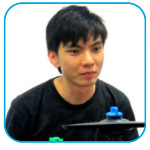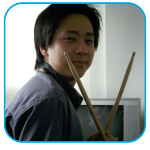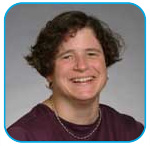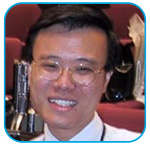
Singapore Lab |
|||||||||||||||||||||||||||||||||

|
Teo Chor Guan MDA
Singapore Executive Director
Teo Chor Guan has more than 14 years of experience in systems engineering for computer graphics and games. Her wide range of experience spans from 3-D graphics research at the Institute of Systems Science in Singapore to building air traffic control systems for MacDonald Dettwiler & Associates in Canada. She has also worked as a software developer at Electronic Arts (EA) Canada for over six years. She holds a Bachelor of Engineering (Electrical and Electronics) from the National University of Singapore and a Masters in Computer Science from Simon Fraser University, Vancouver, Canada. In Singapore, she had worked in the Games Development Group at the School of Design at Nanyang Polytechnic. She was also the Software Engineering Manager in Lucasfilm Animation Singapore before joining Media Development Authority (MDA) as the Program Director for GAMBIT. |
||||||||||||||||||||||||||||||||

|
Maureen Chew
Administrator, Outreach Co-ordinator
Maureen is the administrator and outreach coordinator for the Singapore GAMBIT lab, where she is also the coordinator for the summer program. A friendly and fun small-size human, who tends to be loud and crazy sometimes. Passionate about work and play, she gives her best in everything she does. In the rare case that she is not zoning-out, she enjoys doing random things like taking photos of everyday objects and exploring new places. Playing casual games, browsing through fashion magazines, reading, hiking, whipping up dishes, and playing the piano are just some of the other boring non-stoning stuff she does. She says: “I don’t bite, and I’m definitely nice.” |
||||||||||||||||||||||||||||||||

|
Gerald Tock
Head of Operations
Gerald is responsible for strategy, product strategy, business development and outreach at GAMBIT. With a passion for examining how people seek, evaluate and value experiences and an academic background in marketing and corporate finance, Gerald has grown two bootstrapped companies into strong cash generators; A Singapore studio focused on developing and operating the PC and Wii online fighting game Toribash, and an Australian studio focused on work-for-hire mobile development with top tier publishers such as THQ Wireless. In between the fun times of start-up life, Gerald also established funding programs, funded game companies and worked with game publishers and VCs to grow the games industry ecosystem through his role with the Singapore Government. Gerald loves retro-games where they kept mechanics simple but still managed to be ridiculously challenging. And he has never saved the princess in Super Mario Bros despite the incessant usage of warp zones. Specialties: User behavior, marketing, identifying and executing growth points, business and operational structure. |
||||||||||||||||||||||||||||||||

|
Dominic Chai
Production Manager
Dominic Chai graduated from Computer Engineering at Nanyang Technological University. He has been eager to explore the 'wonders' of the Game Industry. Equipped with 4 years of Game Development experience and a strong passion for games, he has hoped to see his retirement in this industry some day. Dominic participated in the GAMBIT summer internship 2007 as a Scrum-Master to develop a game for two months. Upon his return, he continued his journey and began to work as a Production Assistant at Mikoishi Pte Ltd, a Singapore games development studio. He is currently an Assistant Producer at the Singapore-MIT GAMBIT Game Lab (Singapore lab), and hopes to learn and work with the professionals and talents the industry has to offer. |
||||||||||||||||||||||||||||||||

|
Yeo Jing Ying
Associate Producer
Yeo Jing Ying graduated from National University of Singapore under the Arts and Social Sciences faculty, where she became interested in game design and development process during her course of study. Upon graduation, she participated in an internship with GAMBIT to develop a game prototype as a Game Designer within 2 months at Boston. When she returned to Singapore, her first job was at Mikoishi Pte Ltd, a game development studio, as a Production Assistant for around a year. Currently, she has moved on to work at the Singapore-MIT GAMBIT Game Lab as an Assistant Producer. She hopes to acquire as much experience and knowledge in the games industry as she can by learning from and working with the experts and professionals in this industry. |
||||||||||||||||||||||||||||||||

|
Hoo Jia Ling
Associate Producer
Jia Ling was a QA Tester at Electronic Arts (SG) after graduating with a Diploma in Digital Media Design, where she specialized in Games Design. After honing her skills in Burnout Revenge, SSX 3 and NBA, she moved on to be a Production Assistant in the online games division, where she learnt the ropes of game production. Before joining GAMBIT, she served in a local games studio as a Games Designer for a multiplayer online game, and also as an Assistant Producer for a Game Content Management Tool. She joined GAMBIT as a Games Designer and worked on Showtime (PC and Mobile), before moving on to be an Associate Producer. When she is not killing brain cells @ work, her mind wanders through food and drinks’ recipe, countries she wants to visit, photography, basketball, and ways to inject fun into everyday life. |
||||||||||||||||||||||||||||||||

|
Bruce Chia
Lead Programmer
Bruce Chia Bruce Chia is a fourth year undergraduate of Computer Science at the National University of Singapore. He has a strong interest in developing games in all aspects. He specializes in programming but also has a keen eye for colors, a keen ear for music and a keen mind for game design. Working on games allows him to express his creativity in all areas and never fails to be less than an extremely fulfilling experience for him. During his spare time at his university, he ran a Game Developer Interest Group and influenced the student game developing scene by organizing workshops and competitions, including Singapore's very first Contrast Game Design competition. He also achieved the Best Technical game in the 2006 Code-a-thon competition and became the lead programmer for the GAMBIT games AudiOdyssey and CarneyVale: Showtime. He aspires to one day develop games which would inspire the world, just as other great games have inspired his world. |
||||||||||||||||||||||||||||||||

|
Wong Yi
Programmer
Wong Yi first got introduced to gaming when his parents bought him one of the second generation video game consoles. His first real experience with programming was when he, inspired by gamebooks, started using DOS batch commands to write one of his own. The seed was sowed and his passion inevitably led him to pursue a career in the gaming industry. Wong Yi graduated from Nanyang Technological University in 2006 with a Bachelor's degree in Computer Engineering. He spent his industrial attachment segment of his degree course at Mikoishi Pte Ltd, a local game studio, and was hired as a game developer after graduation. He completed his first published title, DropcastTM, with Mikoishi before joining GAMBIT in 2009. Wong Yi has a strong interest in game development and constantly finds himself enthralled by the almost magical nature of well developed games. He hopes to one day be able to develop games with unique game mechanics that can inspire brand new genres. |
||||||||||||||||||||||||||||||||

|
Chuah Chong Yunn
Programmer
Chong Yunn graduated from NUS School of Computing but he would rather tell people that he graduated from NUS Kent Ridge Hall. Yunn has always wanted to make games ever since young. From pencil and paper and dice to modding and scripting and finally getting his feet wet in the games industry as a full-fledged game programmer. However, he still can't decide whether he loves dancing or games more. Don't ask him to do both (dancing games), because it doesn't work that way. |
||||||||||||||||||||||||||||||||

|
Low Chin Hong
programmer
Chin Hong started learning how to program by making a simple game of tic-tac-toe on an Apple II when he was 8, and has never stopped making games since then. He has since graduated from NUS School of Computing (University Scholars Programme) with a Honours Degree in Computer Science, specializing in Artificial Intelligence and Algorithms. Chin Hong loves First/Third Person Shooters and is proficient in a wide arsenal of weaponry - from melee weapons, to heavy gatling guns, to sniper rifles - whatever it takes to get the job done efficiently. He takes this approach into his work and sees himself as a member of a SWAT team - to tackle coding in the quickest and most efficient way possible. He is armed with 10 programming languages across three different platforms and has particular strengths in rapid prototyping and development. In his free time, Chin Hong likes to dabble in the magical arts of digital music and art. If he is not a game programmer, he most probably would have become a singer-songwriter. In case you're wondering, his favourite is the shotgun. ;) |
||||||||||||||||||||||||||||||||

|
Ng Xi Hui
Programmer
Xihui started his work life as a web/flash developer. He finds pressing keys for repeating similar structured projects boring. Left, he started making games and never looked back. Together with a friend, he started an indie game studio, Nob(pronounce as Noob) Studio. Collectively built 20+ flash games over the span of 3 years. Did programing, some game design, can't really do art, won a couple of competitions. Today, he works at GAMBIT. He still presses keys for a living.. but he loves it. |
||||||||||||||||||||||||||||||||

|
Ang Yi Xin
Artist
Ang Yi Xin graduated from Nanyang Technological University with a Bachelor of Fine Arts in Digital Animation. Her first game development experience at GAMBIT was as an artist for Picopoke in 2008. That sparked her interest in game development and she continued to make games. Her team won the Most Entertaining Game award at NUS Contrast'08 for the game MooPoot. In 2009, she worked on Snap Escape on Facebook and became intensely interested in social media and that explains why she likes to loiter on Facebook. She is also a hardcore casual gamer but occasionally plays some hardcore games casually too. Mixed-media, new media and user experience on an interactive medium intrigues her. Her primary aspiration in the game industry is to create games with interesting mechanics and appealing art styles. During her free time, she enjoys drawing, swimming, traveling, photography and hanging out with her friends and family. |
||||||||||||||||||||||||||||||||

|
Zander Liang
Lead Artist
Zander’s interest for gaming graphics sparked during his growing up days when he first chanced upon “Soul Caliber” in the arcade, which eventually lead him to graduate from Nanyang Polytechnic with a diploma in Digital Media Design. Though not so much of a competitive gamer, he feel it is worthwhile and enjoys playing hardcore multiplayer games with friends. Occasionally, he still plays Street Fighter 2 Super Turbo on his old “barely surviving” Sega Megadrive! |
||||||||||||||||||||||||||||||||

|
Jasmine Phong
Artist
Jasmine Phong is a graduate from Republic Polytechnic with Diploma in New Media. She specializes in art and design. After graduating she became an artist. She produces artwork and animation for games. From there, her interest in making artwork for game grew. She then joined Gambit, which gave her a great learning experience about the games industry. Her experience includes making artwork for mobile games, flash games, iphone games, animated flash stories, posters and many more. In her free time, she likes to watch animation and play games. She hopes that one day she will be able to draw characters that will be memorable to everyone. |
||||||||||||||||||||||||||||||||

|
Ng Shi Kee
Artist
Breathe - dream - observe - feel - think - express. Me word: http://beingjustanotherone.blogspot.com/ |
||||||||||||||||||||||||||||||||

|
Simon Strauss
Artist
Simon Strauss has always dreamed of pursuing career in the creative industry. With the background of Architecture Engineering, he journeyed through various industries from the exhibition design to architectural visualization, while picking up necessary skill sets and experiences along the way, before finally stepped into the industry where his true passion lies in. He is currently working passionately as Game Artist in GAMBIT Game Lab. More info about him can be found on www.thestrauss.com |
||||||||||||||||||||||||||||||||

|
Roland Kie
Level Designer
Roland Kie has been a Hardcore gamer for a full 30 Years and counting. Starting from the day his father woke him up in the middle of the night to present him with Atari + Defender, he hasn’t stopped playing games, and probably never will. Roland’s explorations into the gaming industry initially brought him to the QA side of development, where he caught bugs and ate them for lunch. His further adventures have brought him to Level Design Land, where he ponders over UIs, HUDs and GDDs and sneaking in Street Fighter elements into every project that comes his way. “Angry Birds should have had a Revenge Meter!” Roland loves writing stories and imagining designs for future games, and dreams one day to influence the direction of the Legend of Zelda franchise. |
||||||||||||||||||||||||||||||||

|
Justin Kang
Level Designer
Justin Kang lives videogames, and gave up his pursuit of a degree in psychology to major in computing instead. While he does game design now, he still dabbles in programming and digital art every now and then, and has worked as a gameplay programmer at Double Helix Games in California. He believes the videogame as an interactive medium can be so much more than it already is, and hopes to one day be involved in the development of a game that substantiates that claim. Justin also buys games far faster than he can complete them, but he still holds hope of one day clearing his ridiculous backlog, which is well over a hundred and goes back as far as his beloved Sega Saturn. In whatever other free time he can eke out, he runs, cycles, plays the guitar, and poisons the Internet with his thoughts on game design and uh... stuff, at www.modernsolitude.net. Say hi to Justin Kang! He'll probably reply, unless he's busy stuffing his face with candy and sweetened drinks. |
||||||||||||||||||||||||||||||||

|
Henji Tan
Level Designer
Henji Tan began his career as a game artist working on mobile games in Mikoishi after graduating with a Diploma in Digital Media Design (Games Specialization). His passion for designing games soon led him to transit to a Games Designer role and contributed to the award winning "Steam Iron: The Fallen" RTS mobile game (IGF mobile 2008 "Technical Achievement Award" and finalist for "best game"). He has since moved on to expand his skillset working on PC online and consoles in companies such as Ubisoft. Now with more than 6 years of experience in the games industry, he seeks to enter the realm of the casual and social games where he believes gaming has found new life and potential to deliver meaningful fun to the lives of a wide range of audiences, including non-gamers! |
||||||||||||||||||||||||||||||||

|
Leow Yin Qing
Lead QA Tester
Leow Yin Qing graduated from Nanyang Polytechnic with a Diploma in Digital Media Design. Since his graduation, he levelled up working in various gaming companies like Mikoishi to Lucasarts as a game tester. He has a passion for video games and is rumoured to roam in various gaming networks like Steam and Xbox live. |
||||||||||||||||||||||||||||||||

|
Benjamin Tan
QA Tester
Benjamin Tan graduated from Ngee Ann Polytechnic with a diploma in Information Technology. During his free time, he enjoys playing PC game, watching animation and drama. |
||||||||||||||||||||||||||||||||

|
Kho Chia Wen Sharon
Audio Designer
Music and games started off in her life as," just for fun and leisure". With a mother that nurtured her in both arts and music, she was involved in art and piano classes at the age of 8 years old. In school she was involved in choir and graffiti painting. Sharon graduated from Temasek Polytechnic School in 2006 with a diploma in Apparel (Fashion) & Merchandising. She worked in the fashion industry as a graphic fashion designer for 2 years. Though she enjoyed what she did, she wanted to be more involved not just in visuals but also in sound as well. She wanted to combine both aspects and thus, went to pursue a diploma in Audio engineering in SAE. Upon graduation she managed to get into SINGAPORE-MIT GAMBIT Game Lab and ventured into the game industry from there. Though the learning curve might be challenging at times, she felt great satisfaction when the challenged was achieved. All she can say is that it has never been this good and there is so much more to learn and grow. Sharon's aspiration is to always challenge herself to make music and sounds that intrigue people's senses to a greater measure. In her free time she enjoys composing, singing, drawing, jamming, traveling, watching Hong Kong drama series, jogging, badminton and playing frisbee. |
||||||||||||||||||||||||||||||||
US Lab |
|||||||||||||||||||||||||||||||||

|
William Uricchio MIT
Lead Principal Investigator
Director, MIT Comparative Media Studies
Professor of Foreign Languages and Literatures Professor of Literature and Comparative Media Studies
William Uricchio is Professor and Director of the Comparative Media Studies Program and professor of Comparative Media History at Utrecht University in the Netherlands. He has held visiting professorships at Stockholm University, the Freie Universitat Berlin, and Philips Universitat Marburg; and Guggenheim, Fulbright and Humboldt fellowships have supported his research.
Uricchio considers the transformation of media technologies into cultural practices, and their role in (re-) constructing representation, knowledge and publics. In part, he researches and develops new histories of 'old' media (early photography, telephony, film, broadcasting, and new media) when they were new. And in part, he investigates the interactions of media cultures and their audiences through research into such areas as peer-to-peer communities and cultural citizenship, media and cultural identity, and historical representation in computer games and reenactments. His most recent books include Media Cultures (2006 Heidelberg), on responses to media in post 9/11 Germany and the US, and We Europeans? Media, Representations, Identities (2008, Chicago). He is currently completing a manuscript on the concept of the televisual from the 17th century to the present. His website can be found at www.williamuricchio.com. Specialties: history of media technologies and practices (print, photography, telegraphy, telephony, television, film, digital technologies...); media theory (representation, reception, aesthetic paradigms); social/cultural processes (hierarchization and differentiation); and algorithmic culture |
||||||||||||||||||||||||||||||||

|
Henry Jenkins USC
Lead Principal Investigator
Provost's Professor of Communications, Journalism, and Cinematic Art, USC
Henry Jenkins III is the Provost's Professor of Communications, Journalism, and Cinematic Art at the University of Southern California. He is the author and/or editor of twelve books on various aspects of media and popular culture, including Convergence Culture: Where Old and New Media Collide; Fans, Bloggers and Gamers: Exploring Participatory Culture; The Wow Climax: Tracing the Emotional Impact of Popular Culture; Textual Poachers: Television Fans and Participatory Culture; Hop on Pop: The Politics and Pleasures of Popular Culture and From Barbie to Mortal Kombat: Gender and Computer Games. Jenkins writes regularly about media and cultural change at his blog, henryjenkins.org.
Jenkins has a MA in Communication Studies from the University of Iowa and a PhD in Communication Arts from the University of Wisconsin-Madison. Specialties: the cultural and social aspects of new media, games research (gender and games, education and games, serious games, games as expressions of the culture, trends in the games industry), the role of new media in politics, fan cultures, youth and new media literacy, transmedia storytelling, reality television, comic book culture, children's literature and media, the future of news and journalism, the future of advertising and branding |
||||||||||||||||||||||||||||||||

|
Philip Tan Boon Yew MIT
US Executive Director
Philip Tan is the executive director for the US operations of the Singapore-MIT GAMBIT Game Lab, a game research initiative hosted at the Massachusetts Institute of Technology. He is concurrently a project manager for the Media Development Authority (MDA) of Singapore. He has served as a member of the steering committee of the Singapore chapter of the International Game Developers Association (IGDA) and worked closely with Singapore game developers to launch industry-wide initiatives and administer content development grants as an assistant manager in the Animation & Games Industry Development section of MDA. He has produced and designed PC online games at The Education Arcade, a research group at the Massachusetts Institute of Technology that studied and created educational games. He complements a Master's degree in Comparative Media Studies with work in Boston's School of Museum of Fine Arts, the MIT Media Lab, WMBR 88.1FM and the MIT Assassins' Guild, the latter awarding him the title of "Master Assassin" for his live-action roleplaying game designs. He also founded a DJ crew at MIT. Specialties: digital, live-action and tabletop game design, production and management |
||||||||||||||||||||||||||||||||

|
Jason Beene MIT
Jason Beene is GAMBIT's Art Director, helping our team breathe life into the zeros and ones. Previously, Jason served as Studio Art Director of an internal THQ development group. During those 7 years, Jason was instrumental in the production of numerous Nintendo handheld titles and had the opportunity to work with the likes of Pixar and Nickelodeon. His time at THQ was proudly spent doing everything from pixel pushing to managing/mentoring a talented art staff. Additionally, as an alumni of the Rhode Island School of Design illustration department, Jason aims to offer both industry insight and his own creative talents to help further the efforts of GAMBIT. His artblog can be found at http://jasonbeene.blogspot.com. Specialties: visual arts, digital art, video game art, video game industry |
||||||||||||||||||||||||||||||||

|
Andrew Grant MIT
Technical Director
Embedded Staff: Dearth Game Director: Improviso Product Owner: Robotany Staff Liaison: Bosnobo: Primate Change Thanks to two wonderfully dedicated game-playing grandmothers, Andrew Grant started playing games before he could hold the cards. From there, he went on to explore board games, strategy games, role-playing games, and computer games. This exploration shows no signs of slowing down. Andrew graduated from MIT in 1993 with Bachelor's degrees in both Computer Science and Mathematics (6 and 18, darnit) and a minor in Creative Writing. After 6 months in the real world, he discovered that someone would actually pay him to design and program computer games, so he returned to his gamer roots by joining Looking Glass Technologies, and then DreamWorks Interactive. Since then, Andrew has survived 10 years as a programmer-for-hire and independent developer in projects ranging from underwater robotics to yet more games. Now, Andrew is the Technical Director for GAMBIT, applying his rather eclectic skillset to the wide array of technologies used in the lab. Specialties: computer programming, computer game development, game design, tabletop role playing games |
||||||||||||||||||||||||||||||||

|
Abe Stein MIT
Audio Director
Sound: Tipping Point (Digital), Camaquen Embedded Staff: Pierre: Insanity Inspired Product Owner: Seer, Yet One Word Game Director: A Closed World Staff Liaison: Phantomation Abe Stein began making goofy noises when he was very young, creating detailed action sequences and death defying car chases on the kitchen floor with his G.I. Joes and Matchbox cars. Having since been enlightened to the capabilities of recording technology, Abe can still be found in front of a microphone trying to replicate the sound of a 1986 IROC-Z engine with his mouth. Abe graduated from Haverford College with a Bachelor's degree in Religion, and studied audio engineering and sound design at the Center for Digital Imaging Arts of Boston University. A one-time high school English and History teacher, his sound design, music and mix work can be heard on a variety of educational videos, long and short form documentary films, various promotional shorts, and on the Cartoon Network's Adult Swim animated series Assy McGee. Abe comes to the GAMBIT having most recently worked as a sound designer for Blue Fang Games, makers of the Zoo Tycoon franchise. As Audio Director at GAMBIT, Abe is looking forward to exploring new ways to improve the efficacy of sound in games to help create compelling, evocative and meaningful experiences. His website can be found at www.stein-sound.com. Specialties: Vroom, Clang, Zip, Click, Pop, and Boom. |
||||||||||||||||||||||||||||||||

|
Sara Verrilli MIT
Development Director
Embedded Staff: Waker, Woosh Game Director: Seer, Yet One Word, Eksa: Isle of the Wisekind Staff Liaison: Movers & Shakers Sara Verrilli has spent her professional career in the videogame industry, starting with the day she walked out of MIT's Course V graduate studies and into a position as QA Lead at Looking Glass Technologies for System Shock. However, her game organizing endeavors started much earlier; she helped found a role-playing club at her high school by disguising it as a bridge group. Since then, she's been a game designer, a product manager, a producer, and a QA manager, in no particular order. A veteran of both Looking Glass Technologies and Irrational Games, she's worked on eight major published games, and several more that never made it out the door. As Lead Producer at GAMBIT, she looks forward to corralling, encouraging, and exploring the creative chaos that goes into making great games, and figuring out just the right amount of order to inject into the process. And, while she still doesn't understand bridge, she does enjoy whist. |
||||||||||||||||||||||||||||||||

|
Clara Fernández-Vara MIT
Postdoctoral Researcher
Product Owner, Production: Rosemary Product Owner: Symon, Stranded in Singapore, The Last Symphony Clara Fernández-Vara is a Postdoctoral Researcher at the Singapore-MIT GAMBIT Game Lab. Her work concentrates on adventure games, as well as the integration of stories in simulated environments. She is particularly interested in cross-media artifacts from the standpoint of textual analysis and performance. Clara holds a Ph.D. in Digital Media from the Georgia Institute of Technology. She earned a BA in English Studies by the Universidad Autónoma de Madrid (2000), and was awarded a fellowship from the La Caixa Foundation to pursue a Masters in Comparative Media Studies from MIT (2004). Specialties: videogame theory, textual analysis, adventure games, stories in games, spatial design, puzzles, performance, relationships between games and other media, theatre, film, Quality Assurance. |
||||||||||||||||||||||||||||||||

|
Rik Eberhardt MIT
Studio Manager
Embedded Staff: Abandon Game Director: elude, PAX POX, Stranded in Singapore Staff Liaison: Fugue, The Last Symphony As Studio Manager for the Singapore-MIT GAMBIT Game Lab, Rik Eberhardt spends his days playing Tetris: with people, boxes, tasklists, equipment, and time. When not staring at a spreadsheet trying to fit in another computer purchase, a last minute event budget, or placing undergraduate researchers on a GAMBIT project, he's chipping away at spreadsheets on his DS, reproducing pixel-art in Picross and Picross 3D. His favorite moments on the job are working on projects with student workers and having fun social interactions forced on him despite his busy schedule. Rik also produces and DJs a radio program on WMBR, "Last Dance at the Death Disco," featuring postpunk and underground music produced from the 70s-80's in the US, UK, and Europe: http://deathdisco.fm Specialties: production, management, postpunk, cats |
||||||||||||||||||||||||||||||||

|
Generoso Fierro MIT
Outreach Coordinator
Generoso Fierro is the Outreach Coordinator for GAMBIT, where he creates video the content for our website, assists with the summer program and produces GAMBIT events. Currently, Generoso is at WMBR, where he is the longtime DJ of a program "Generoso's Bovine Ska and Rocksteady." The show concentrates on the music of Jamaica prior to reggae (mento, ska and rocksteady) and has been on the air since 1997. A film maker and avid film fan, "Gene" has directed and produced two feature documentaries, "Lynn Taitt: Rocksteady" about the Trinidadian born guitarist who invented the rocksteady rhythm and "Derrick Morgan: I Am The Ruler", featuring the titled legendary "King of Ska" from Jamaica. Specialties: documentary film making (specifically early Jamaican musics); club and radio DJ at WMBR 88.1 covering Jamaican music from 1955-1970 |
||||||||||||||||||||||||||||||||

|
Mike Rapa MIT
Technology Support Specialist
Design, Art: Tipping Point, Tipping Point Digital Additional Art: Ochos Locos, Rosemary As Technology Support Specialist Michael Rapa is the first point of contact for CMS and GAMBIT technical support. He received his BFA from The Art Institute of Boston in 2007 with a focus on Graphic Design and Digital Illustration and continues to draw whenever he can. He also makes games sometimes... Check out his work at his website: http://michaelrapa.com |
||||||||||||||||||||||||||||||||

|
Jason Begy
MIT
Research Associate
Graduate Alumni, CMS SM'10 Product Owner, Design, Documentation: Tipping Point (Digital) Production, Design, Documentation: Tipping Point Research Assistant, Pierre: Insanity Inspired Game Director: Robotany Product Owner: Movmote Jason Begy graduated from Canisius College in 2005 with a Bachelor of Arts in English, and in 2008 earned a Master's degree in Professional Writing and Information Design from Northeastern University. Continuing the process of avoiding a career, he then came to CMS as a graduate student where he wrote his master's thesis on the use of metaphor in game criticism and design. Current projects include ongoing research into casual games and modes of representation in games. He blogs about board game semiotics at gamebits.tumblr.com.
|
||||||||||||||||||||||||||||||||

|
Todd Harper
MIT
Had you asked Todd Harper at age 17 -- a music education major at the University of Wisconsin - Madison, 11 year euphonium and choir veteran -- if someday he would be a researcher at MIT studying games, there's a good chance he'd have laughed at such an absurd claim. Yet 15 years and one doctorate later, here he is, a postdoctoral researcher at GAMBIT. After getting his bachelor's degree in Radio/TV/Film at Madison in 2001, he worked in distance learning and web editing at Indiana State University before moving to his hometown of Syracuse for a masters in Media Studies at Syracuse University, and then to Ohio University for a recently-completed doctorate in Mass Communications. His research combines a focus on digital games with an interest in feminist and queer theory and popular culture. When he is not doing actual research on games, Todd spends a good deal of time playing them; his favorites tend to be over the top fighting games and RPGs that appeal to his campy sense of aesthetics. Inspired by the fighting game players he spoke to while working on his dissertation, his next goal is to travel to the EVO tournament in 2011, learn to use an arcade stick, and still get thoroughly destroyed in the first round of the tourney. You can follow him on Twitter or read his highly infrequently updated blog, Stay Classy. Specialties: Game studies, fighting games, popular culture, textual analysis, game criticism, mass media criticism, media and identity |
||||||||||||||||||||||||||||||||

|
Andrew Whitacre
MIT
Communications Manager
Andrew conducts the communications efforts for CMS (websites, press relations, and project and event publicity) as well as those for MIT's Center for Future Civic Media. A native of Washington, D.C., he holds degrees in communication from Wake Forest University and in creative writing from Emerson College. His marketing and P.R. skills were honed first at Houghton Mifflin and later at Tufts University. He was also the long-time fiction editor for Identity Theory and is developing a literary aggregation tool at Readsfeed.com. |
||||||||||||||||||||||||||||||||

|
Konstantin Mitgutsch
Konstantin Mitgutsch is a Max Kade visiting researcher at the Education Arcade. He worked in the fields of learning, media studies, computer games and age rating systems at the University of Vienna for several years. His research focuses on learning processes in computer games and in particular on the role of passion, disappointment, failure and confrontation in gameplay experiences. In his project titled "Re-Learning Patterns in Computer Games" supported by the Max Kade Foundation New York, Mitgutsch investigates central learning patterns that foster recursive and deep forms of learning in games. He studied Media Education and Philosophy of Education at the University of Vienna and the Humboldt University Berlin and earned a MA in Education Science, Sociology, Media Studies and Philosophy (2003) and a Ph.D. in 2009. He is participating as an expert member for the Austrian Federal Office for the Positive Assessment of Computer and Console Games and is on the expert council of the Pan European Game Information (PEGI). Since 2007 he organizes the annual Vienna Games Conference FROG. |
||||||||||||||||||||||||||||||||

|
Patrick Kelly
Financial Administrator
These days, Patrick Kelly speaks mostly in numbers, providing fiscal support to Gambit's U.S. Director and Studio Manager. Before coming to MIT, he worked for two small businesses as office jack-knife, managing projects in staff development, communications design, and cost analysis. In 2008, Patrick earned a Certificate in Graphic Design from Boston's School of the Museum of Fine Arts, but that's really neither here nor there. Patrick's interests include: playing violin, mechanical puzzles, cartography, and too. much. coffee. |
||||||||||||||||||||||||||||||||
Collaborators |
|||||||||||||||||||||||||||||||||

|
Golam Ashraf NUS
Lecturer, Computer Science
Product Owner: Shadow Shoppe Golam Ashraf's background is in analytical techniques in computer animation and graphical models. In his Ph.D. thesis on semantic correspondence-based motion editing for humanoids, he proposed intuitive kinematics techniques for motion analysis, correspondence and interpolation. He has worked for 2 1/2 years on movie production tools and pipelines for fur and character animation. Over the last 4 years in NUS, he has produced real time models for fur, amorphous phenomena, fluid simulation, crowd AI and rendering, and layered anatomical models. He teaches game development and interactive media, covering practical methods, algorithms and content pipelines. His students explore next generation techniques in interaction, real time rendering, and artificial intelligence, and pedagogical themes focused on children. His course output has been showcased at various public venues like Singapore Science Center and Microsoft Singapore. Outside academia, he has considerable stage theater experience in acting, direction and technical production. His current research is geared towards engaging edutainment applications with interactive character creation/manipulation tools for toddlers, children and young adults. His website can be found at http://www.comp.nus.edu.sg/~ashraf/. |
||||||||||||||||||||||||||||||||

|
Frédo Durand MIT
Associate Professor, Computer Science and Artificial Intelligence Laboratory
Frédo Durand is an associate professor in the Electrical Engineering and Computer Science Department of the Massachusetts Institute of Technology, and a member of the Computer Science and Artificial Intelligence Laboratory. He received his PhD from Grenoble University (France) in 1999. He worked with Claude Puech and George Drettakis on both theoretical and practical aspects of 3D visibility. From 1999 till 2002, he was a post-doctoral researcher in the MIT Computer Graphics Group with Julie Dorsey, where he is now an associate professor. His research interests span most aspects of picture generation and creation. This includes realistic graphics, real-time rendering, non-photorealistic rendering, as well as computational photography. His recent emphasis is on the use of tools from signal processing and inspiration from perceptual sciences. He received an inaugural Eurographics Young Researcher Award in 2004, an NSF CAREER award in 2005, an inaugural Microsoft Research New Faculty Fellowship in 2005 and a Sloan fellowship in 2006. His website can be found at http://people.csail.mit.edu/fredo/. |
||||||||||||||||||||||||||||||||

|
Anthony Fang NUS
Assistant Professor, Computer Science
Anthony Fang is an Assistant Professor in the Department of Computer Science at the National University of Singapore. He received his PhD in Computer Science at Brown University in 2003. His primary research interest is in the synthesis of physically based animation of humanlike characters. His website can be found at http://www.comp.nus.edu.sg/~afang. |
||||||||||||||||||||||||||||||||

|
David Hsu
NUS
David Hsu is currently an associate professor of computer science at the National University of Singapore and a member of NUS Graduate School for Integrative Sciences & Engineering (NGS). His research spans robotics, computational biology, and geometric computation. Recently he has been working on AI planning techniques for modeling user intention and behavior in interative computer games. He received his B.Sc. in computer science & mathematics from the University of British Columbia, Canada and his Ph.D. in computer science from Stanford University, USA. After leaving Stanford, he worked at Compaq Computer Corp.'s Cambridge Research Laboratory and the University of North Carolina at Chapel Hill. At the National University of Singapore, he held the Sung Kah Kay Assistant Professorship and was a Faculty Fellow of the Singapore-MIT Alliance. His website can be found at http://www.comp.nus.edu.sg/~dyhsu/. |
||||||||||||||||||||||||||||||||

|
Eric Klopfer
MIT
Director of the MIT Teacher Education Program
Scheller Career Development Professor of Science Education and Educational Technology at MIT Product Owner: Backflow Eric Klopfer is the Director of the MIT Teacher Education Program and the Scheller Career Development Professor of Science Education and Educational Technology at MIT. Klopfer's research focuses on the development and use of computer games and simulations for building understanding of science and complex systems. His research explores simulations and games on desktop computers as well as handhelds. He currently runs the StarLogo, http://education.mit.edu/starlogo, project, a desktop platform that enables students and teachers to create computer simulations of complex systems. He is also the creator of StarLogo TNG, a new platform for helping kids create 3D simulations and games using a graphical programming language. On handhelds, Klopfer's work includes Participatory Simulations, http://education.mit.edu/pda, which embed users inside of complex systems, and Augmented Reality simulations, http://education.mit.edu/ar, which create a hybrid virtual/real space for exploring intricate scenarios in real time. He is the co-director of The Education Arcade, which is advancing the development and use of games in K-12 education. |
||||||||||||||||||||||||||||||||

|
Wee Sun Lee
NUS
Associate Professor of Computer Science
Product Owner: Dearth Wee Sun Lee is an associate professor in the Department of Computer Science at the National University of Singapore. He obtained his PhD from the Australian National University in 1996 and was a research fellow at the Australian Defence Force Academy from 1996 to 1998 prior to joining the National University of Singapore. He is interested in machines that learn, perform inference, make decisions and plan. He works on obtaining theoretical understanding of when learning, inference and planning can be done effectively, on developing effective algorithms for these problems, and also on applying the algorithms to applications such as information extraction, natural language understanding, robotics and games. His website can be found at http://www.comp.nus.edu.sg/~leews/. |
||||||||||||||||||||||||||||||||

|
Tze-Yun Leong
NUS
Associate Professor of Computer Science and Vice Dean at the School of Computing
Tze-Yun Leong is an Associate Professor of Computer Science and Vice Dean at the School of Computing, National University of Singapore. She directs the Medical Computing Laboratory at the School and leads the multi-disciplinary Biomedical Decision Engineering Group at the University. She received her S.B., S.M., and Ph.D. in Electrical Engineering and Computer Science from the Massachusetts Institute of Technology (MIT), USA. Tze-Yun's research interests are in decision-theoretic artificial intelligence, cognitive modeling, machine learning, adaptive computing, and biomedical informatics. She teaches a graduate course in Uncertainty Modeling in Artificial Intelligence. She has also led the development of diagnostic, planning and execution, prognostic, and information integration technologies and systems, both proprietary and open source, in different domains – including the health care, defense, and pharmaceutical industries. Her current work focuses on integrating cognitive and probabilistic modeling techniques to support dynamic decision making in game environments with intelligent and illusive opponents. The explorations enabled in the controlled game situations and the experiences gained from the real-life domains complement each other to support development of new technologies that address the common computational challenges in changing environments. Her website can be found at http://www.comp.nus.edu.sg/~leongty. |
||||||||||||||||||||||||||||||||

|
Tomas Lozano-Perez
MIT
Professor of Computer Science and Engineering
Product Owner: Dearth Tomas Lozano-Perez is Professor of Computer Science and Engineering at MIT and a member of the Computer Science and Artificial Intelligence Laboratory. He has all his degrees (SB '73, SM '76, PhD '80) from MIT in Computer Science. He has been the Associate Director of the Artificial Intelligence Laboratory and Associate Head for Computer Science of MIT's Department of Electrical Engineering and Computer Science. His research has been in robotics (configuration-space approach to motion planning), computer vision (interpretation-tree approach to objection), machine learning (multiple-instance learning), medimaging (computer-assisted surgery) and computational chemistry (drug activity prediction and protein structure determination from NMR & X-ray data). His current research focuses on decision-theoretic approaches to robot motion planning in the presence of uncertainty. His web site can be found at http://people.csail.mit.edu/tlp/. |
||||||||||||||||||||||||||||||||

|
Tim Marsh NUS
Assistant Professor, Communications and New Media and Mixed Reality Lab (MXR)
Product Owner, Woosh, Waker Tim Marsh is currently Assistant Professor in Communications and New Media, and member of the Mixed Reality Lab (MXR) at the National University of Singapore (NUS). His Ph.D is in Computer Science specializing in Human-Computer Interaction (HCI) from the HCI Group, University of York, UK, and Masters degree is in Computer Graphics & Visualization. He teaches graduate modules in serious games and human-computer interaction, covering design, evaluation and prototyping of virtual and gaming environments for purpose, and machinima for learning. Past students of Tim's modules have presented and published their work at ACM SIGGRAPH Video Games Symposium 2008, Los Angeles (recipients of the 2nd best paper award) and ISAGA2009, Singapore. Tim's interdisciplinary research interests are in design and development for experiential use of technological products and digital media. His research in gaming, learning and virtual environments focuses on film informing design for experiential and contemplative gameplay, development of continuous and unobtrusive approach to analyze player's behavior and experience, and using an activity theory-based approach to support design of narrative, story and gameplay. He's previously held positions in the Integrated Media Systems Center (IMSC) at the University of Southern California (USC), Los Angeles and at Eindhoven University of Technology, The Netherlands. His website can be found at http://ap3.fas.nus.edu.sg/fass/cnmmt/. |
||||||||||||||||||||||||||||||||

|
Kevin McGee NUS
Associate Professor
Head of Partner Technologies Research Group Kevin McGee is currently an Associate Professor at the National University of Singapore where he leads the Partner Technologies Research Group. He does research to develop adaptive computational partners that facilitate and increase participation in life's interesting and important challenges. This involves theoretical and applied work at the intersection of end-user programming, artificial intelligence, cognitive science, design methods, media studies, and the arts. Current projects involve the study and development of artificial team-mates/partners for real-time computer games, interactive storytelling, and music ensembles. He has a Masters degree from Harvard University and a PhD from the MIT Media Laboratory. See the Partner Technologies Research Group site at http://www.enactive.com. |
||||||||||||||||||||||||||||||||

|
Alex Mitchell NUS
Instructor, Communications and New Media
Product Owner, Wiip Alex Mitchell teaches interactive media in the Communications and New Media Programme (Faculty of Arts and Social Sciences) at the National University of Singapore (http://www.fas.nus.edu.sg/cnm). Before joining NUS, he was a lecturer at the School of Design, Nanyang Polytechnic, where he taught and developed projects in interactive media and games. Alex has worked as an interaction designer at IDEO, London, and at Kent Ridge Digital Labs, Singapore. He has an M.Sc. in Computer Science (Human-Computer Interaction) from the University of Toronto. His work has been shown at SIGGRAPH'98, at the Science Museum in London, at Graphite 2004 at Nanyang Technological University, Singapore, and as part of the Creative Curating Lab at the Singapore Art Show 2005. |
||||||||||||||||||||||||||||||||

|
Nick Montfort MIT
Assistant Professor of Digital Media, Program in Writing and Humanistic Studies
Nick Montfort's digital media projects include the blog Grand Text Auto, where he and five others write about computer narrative, poetry, games, and art; Ream, a 500-page poem written on one day; Mystery House Taken Over, a collaborative "occupation" of a classic game; Implementation, a novel on stickers written with Scott Rettberg; The Ed Report, a serialized novel written with William Gillespie; and the interactive fiction pieces Book and Volume, Ad Verbum, and Winchester's Nightmare. Montfort edited The Electronic Literature Collection Volume 1 (with N. Katherine Hayles, Stephanie Strickland, and Scott Rettberg, ELO, 2006) and The New Media Reader (with Noah Wardrip-Fruin, The MIT Press, 2003). He wrote Twisty Little Passages: An Approach to Interactive Fiction (The MIT Press, 2003), and, with William Gillespie, 2002: A Palindrome Story (Spineless Books, 2002), which was acknowledged by the Oulipo as the world's longest literary palindrome. He is now investigating narrative variation in interactive fiction, the human meanings and machine functions of code, and the role of platforms in creative computing. Montfort and Ian Bogost are now writing Video Computer System: The Atari 2600 Platform. Montfort's Ph.D. is in computer and information science from the University of Pennsylvania. He earned masters degrees at MIT (at the Media Lab) and Boston University (in creative writing — poetry). His personal site can be found at http://www.nickm.com. |
||||||||||||||||||||||||||||||||

|
Scot Osterweil
MIT
Scot Osterweil is the project manager for the Education Arcade and is currently running "Learning Games to Go," a federally funded project designed to develop mobile games that teach math and literacy to underserved youth. Formerly the Senior Designer at TERC, a nationally known research & development center devoted to math and science education, Osterweil designed Zoombinis Island Odyssey, winner of the 2003 Bologna New Media Prize. This is the latest game in the Zoombinis line of products (Riverdeep/TLC). Scot is the creator of the Zoombinis, and with Chris Hancock he co-designed the multi-award winning Logical Journey of the Zoombinis, and its first sequel, Zoombinis Mountain Rescue. Scot is the also the designer of the TERCworks games Switchback and Yoiks!, the latter also with Chris Hancock. Scot's other software designs include work on the educational products Tabletop II, Tabletop and Tabletop Jr., and IBM's The Nature of Science. At TERC he participated in research projects on the role of computer games in learning, and on the use of video in data collection and representation. Previously, he worked in television, on the production of Public Television's Frontline, Evening at Pops, and American Playhouse, and as an animator on a wide range of programs. He is a graduate of Yale College with a degree in Theater Studies. |
||||||||||||||||||||||||||||||||

|
Leslie Pack Kaelbling
MIT
Professor of Computer Science and Engineering
Research Director of the Computer Science and Artificial Intelligence Laboratory (CSAIL) Product Owner: Dearth Leslie Pack Kaelbling is Professor of Computer Science and Engineering and Research Director of the Computer Science and Artificial Intelligence Laboratory (CSAIL) at the Massachusetts Institute of Technology. She has previously held positions at Brown University, the Artificial Intelligence Center of SRI International, and at Teleos Research. She received an A. B. in Philosophy in 1983 and a Ph. D. in Computer Science in 1990, both from Stanford University. Prof. Kaelbling has done substantial research on designing situated agents, mobile robotics, reinforcement learning, and decision-theoretic planning. In 2000, she founded the Journal of Machine Learning Research, a high-quality journal that is both freely available electronically as well as published in archival form; she currently serves as editor-in-chief. Prof. Kaelbling is an NSF Presidential Faculty Fellow, a former member of the AAAI Executive Council, the 1997 recipient of the IJCAI Computers and Thought Award, a trustee of IJCAII and a fellow of the AAAI. Her web site can be found at http://people.csail.mit.edu/lpk/. |
||||||||||||||||||||||||||||||||

|
Jeff Orkin
MIT
Jeff Orkin is a PhD candidate in the Cognitive Machines Group at the MIT Media Lab. Previously, Jeff spent nine years developing A.I. systems in the game industry. At Monolith Productions, Jeff developed A.I. systems for the award winning titles F.E.A.R. and No One Lives Forever 2. More information available at http://jorkin.com. |
||||||||||||||||||||||||||||||||

|
Jovan Popović MIT
Associate Professor, Computer Science and Artificial Intelligence Laboratory
Jovan Popović is an assistant professor in the Department of Electrical Engineering and Computer Science and a member of the Computer Graphics Group in the Computer Science and Artificial Intelligence Laboratory. His goal is to enrich human communication with intuitive computer design tools that could help teachers to develop compelling examples of hard-to-describe concepts, storytellers to animate their tales, and artists to discover new forms of expression. This research employs computer science, mathematics and physics to explore the applications of geometric modeling (the design of shapes) and computer animation (the design of motion) to the fields of computer graphics, human-computer interaction, biomechanics, robotics, and design. Before joining MIT in the Fall of 2001, Jovan Popović received his Ph.D. in Computer Science from Carnegie Mellon University and his B.S. degrees with highest distinction in Mathematics and Computer Science from Oregon State University. He was born in Belgrade and was one of the top junior table-tennis players in Yugoslavia. Occasionally, he still relies on his (now rusty) skills in his half-hearted attempts to swindle unsuspecting friends. More frequently, he spends his free time engaged in a sports activity or in a social dance. His website can be found at http://people.csail.mit.edu/jovan/. |
||||||||||||||||||||||||||||||||

|
Ong Yew Soon
Associate Professor, Nanyang Technological University
Ong Yew Soon is currently Director of the Centre for Computational Intelligence and an Associate Professor with the School of Computer Engineering, Nanyang Technological University, Singapore. He received his Bachelors and Masters degrees in Electrical and Electronics Engineering from Nanyang Technological University and subsequently his PhD from University of Southampton, UK. He is editor-in-chief of Memetic Computing Journal, chair of the Task Force on Memetic Computing in the IEEE Computational Intelligence Society Emergent Technology Technical Committee, chief editor of book series on Studies in adaptation, Learning and optimization by Springer-Verlag, associate editor of IEEE Computational Intelligence Magazine, IEEE Transactions on Systems, Man, Cybernetics-Part B and International Journal of Systems Science. His current research interests include computational intelligence spanning memetic computing, evolutionary optimization using approximation, complex design optimization, cloud computing, and soft computing. His website can be found at: http://www3.ntu.edu.sg/home/asysong/. |
||||||||||||||||||||||||||||||||

|
Russ Tedrake MIT
Assistant Professor, EECS and CSAIL
Russ Tedrake is an Assistant Professor in the Department of Electrical Engineering and Computer Science at MIT, and a member of the Computer Science and Artificial Intelligence Lab. He received his B.S.E. in Computer Engineering from the University of Michigan, Ann Arbor, in 1999, and his Ph.D. in Electrical Engineering and Computer Science from MIT in 2004, working with Sebastian Seung. After graduation, he spent a year with the MIT Brain and Cognitive Sciences Department as a Postdoctoral Associate. During his education, he has spent time at Microsoft, Microsoft Research, and the Santa Fe Institute. Professor Tedrake's research group is interested in underactuated motor control systems in animals and machines that are capable of executing dynamically dexterous tasks and interacting with uncertain environments. They believe that the design of these control systems is intimately related to the mechanical designs of their machines, and that tools from machine learning and optimal control can be used to exploit this coupling when classical control techniques fail. Current projects include robust and efficient bipedal locomotion on flat terrain, multi-legged locomotion over extreme terrain, flapping-winged flight, and feedback control for fluid dynamics. His website can be found at http://people.csail.mit.edu/russt. |
||||||||||||||||||||||||||||||||

|
Yong Peng Why NUS
Assistant Professor, Psychology
Yong Peng Why is an assistant professor of psychology at the National University of Singapore. He completed his doctoral education in 2001 at the University of St Andrews. His current research interests include the physiological sequala of emotions and their implications for health/illness; cynical hostility and cardiovascular regulation during psychological stress and recovery; the relationship between cynical hostility and social support provision; perceived control, objective control conditions and their relationship to hemodynamic processes regulating blood pressure during psychological stress; and psychophysiological processes during Human-Computer Interactions. His website can be found at http://ap3.fas.nus.edu.sg/fass/psywyp/. |
||||||||||||||||||||||||||||||||

|
Lonce Wyse NUS
Associate Professor, Communications and New Media Programme
Director, IDMI Arts & Creativity Lab Project Lead: AudiOdyssey Lonce Wyse writes: "I think in sound. I directed the development of the FlexEffex and the ASound systems for building and interacting with real-time sound models." His website can be found at www.zwhome.org/~lonce/.
|

|
Foo Chek Yang TP
Postdoctoral Researcher
Foo Chek Yang lectures game development at Temasek Polytechnic in Singapore, has a M. Business in IT and earned his Ph.D in Information Systems by research into player behavior in large virtual worlds. He once spent upwards of more than a hundred hours a week in MMORPGs ("all in the name of research", as he claims), ran raiding guilds, and is a 'socializer' according to Richard Bartle's player types. His professional interest areas include virtual world player behavior, online game design, software engineering, and game-based learning. In his free time, he is also an amateur photographer, a wannabe pianist and composer, and a terrible cook.
|
| |||||||||||||||||||||||||||||





